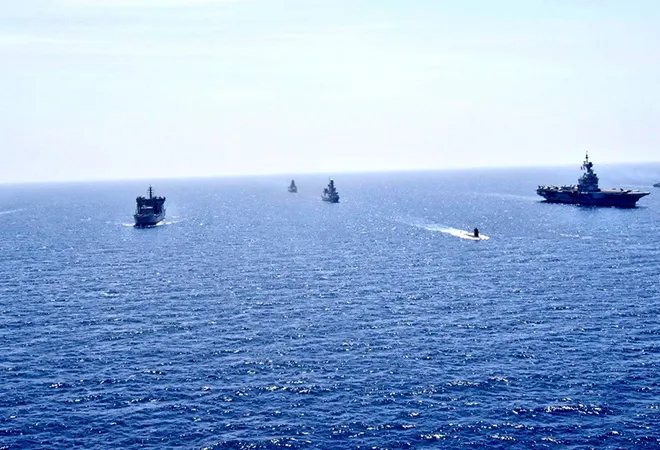-
CENTRES
Progammes & Centres
Location
France has emerged as one of India’s closest strategic partners and the relationship is likely to bloom further in the coming years.

Two weeks ago, the Indian and French navies conducted a three-day (April 25-27) bilateral naval exercise. The exercise was part of the annual series of bilateral exercises between the Indian and French militaries that have the stated goal of upholding the rules-based order and promoting a stable maritime security order in the Indo-Pacific. Varuna 2021 was the 19th edition of this series of exercises. France has remained one of India’s strongest strategic partners and given the growing security challenges India faces in its immediate neighborhood and in the Indo-Pacific, it is likely that there will be further enhancement of this partnership.
An Indian Ministry of Defense statement on the Varuna 2021 exercises stated that “the three-day Varuna
France’s military presence in the Indian Ocean is significant, with facilities in the island of La Réunion, Mayotte, and the French Southern and Antarctic Lands. India and France signed a military logistics agreement in 2018, which gives reciprocal access to each other’s military facilities. With that agreement in hand, India can be expected to widen its strategic outreach in the Indian Ocean. This will enhance India’s overall naval capacity, especially in the western Indian Ocean.
India and France signed a military logistics agreement in 2018, which gives reciprocal access to each other’s military facilities. With that agreement in hand, India can be expected to widen its strategic outreach in the Indian Ocean. This will enhance India’s overall naval capacity, especially in the western Indian Ocean.
A French Embassy statement said “The ‘Varuna’ joint exercise is part of the French carrier strike group’s ‘CLEMENCEAU 21’ deployment, which the French Navy is conducting from February to June 2021 in the eastern Mediterranean, the Gulf and the Indian Ocean (Arabian Sea). Its goal is to contribute to the stabilization of these strategic zones and strengthening cooperation with the navies of partner countries, in particular India for the Indian Ocean component.”
For the Varuna 2021 exercises, the Indian side was represented by the guided missile destroyer INS Kolkata, guided missile frigates INS Tarkash and INS Talwar, Fleet Support Ship INS Deepak, a Kalvari class submarine (an Indian-built version of the French Scorpene class submarine) and P8I Long Range Maritime Patrol Aircraft. The French force included the aircraft carrier Charles-de-Gaulle (carrying various types of aircraft including Rafale-M fighters and E2C Hawkeye for surveillance), Horizon-class air defense destroyer Chevalier Paul, Aquitaine-class multi-missions frigate FNS Provence and the command and supply ship Var.
Following the exercise, the French ambassador to India stated in a tweet that “During three days of intensive drills, 8 Flag of France and Flag of India warships & their air wings demonstrated high level of interoperability in all aspects of naval warfare: anti-surface, anti-submarine, air defense.” The French Embassy in a statement on the exercise noted that “this exercise underscores the shared interests and commitment of both nations in promoting maritime security in the Indo-Pacific. It bears testimony to the vitality of the strategic partnership between France and India, which continued being strengthened despite the pandemic.”
The Indian Navy was also upbeat about the exercise, with the navy spokesperson praising in a tweet the growing “scope, complexity of ops & level of participation.” The Indian Ministry of Defense stated that the “INS Tarkash will continue to exercise with the French Navy’s Carrier Strike Group (CSG)” for a few more days. Clearly, this is a demonstration of the comfort level between the Indian and French militaries as well as the increasing strategic synergy between the two countries.
This comfort level has been growing. It was evident when the India and France for the first time undertook joint patrols from Reunion Island in March 2020, France’s naval base in the Indian Ocean. Following that exercise, the commander of the Indian Navy P-8I, which was part of the joint patrols, reportedly stated that these operations “make it possible to maintain the security of international maritime routes for trade and communications.” The kind of patrols India undertook with France is significant because previously India typically did Coordinated Patrols (CORPAT) only with its neighbors, countries like Bangladesh, Myanmar, Thailand, and Indonesia. The U.S. had earlier pitched for such an exercise with India, but Delhi is reported to have turned down the request.
While the bilateral engagement will remain a key pillar, involving Paris in many trilateral and minilateral platforms in the Indo-Pacific will strengthen India’s maneuverability as India aligns closely with the U.S. and other Western powers
The views expressed above belong to the author(s). ORF research and analyses now available on Telegram! Click here to access our curated content — blogs, longforms and interviews.

Dr Rajeswari (Raji) Pillai Rajagopalan was the Director of the Centre for Security, Strategy and Technology (CSST) at the Observer Research Foundation, New Delhi. Dr ...
Read More +